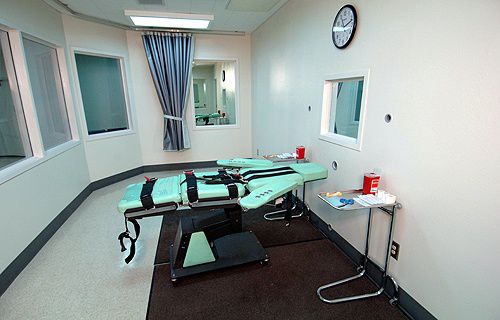Commenting on the April 29 bungled execution of a death row inmate at the state penitentiary, Oklahoma City’s archbishop has called for a reconsideration of capital punishment. “We certainly need to administer justice with due consideration for the victims of crime, but we must find a way of doing so that does not contribute to the culture of death, which threatens to completely erode our sense of the innate dignity of the human person and of the sanctity of human life from conception to natural death,” Archbishop Paul Coakley said April 30. Inmate Clayton Lockett was administered a sedative at 6:23 p.m., according to the BBC. Ten minutes later, he was said to be unconscious and was given lethal injection, but soon began to writhe and breathe heavily. Cary Aspinwall, a journalist with the Tulsa World, was covering the execution, and tweeted that at 6:37, “Lockett was not unconscious and said something is wrong,” and that two minutes later, he was lifting his head and that officials “closed curtain and stopped it.” It was announced that Lockett did not die until 7:06, of a massive heart attack. Robert Patton, Oklahoma’s corrections director, stated that Lockett’s vein failed during the execution, preventing the lethal drugs from working as they were intended. “The execution of Clayton Lockett really highlights the brutality of the death penalty,” Archbishop Coakley reflected. “And I hope it leads us to consider whether we should adopt a moratorium on the death penalty or even abolish it altogether.” “How we treat criminals says a lot about us as a society.” “Once we recover our understanding that life is a gift from our Creator, wholly unearned and wholly unmerited by any of us, we will begin to recognize that there are and ought to be very strict limits to the legitimate use of the death penalty,” the archbishop continued. “It should never be used, for example, to exact vengeance, nor should it be allowed simply as a deterrent. In general, there are others ways to administer just punishment without resorting to lethal measures.” Lockett had been convicted of shooting 19-year-old Stephanie Neiman in 1999, and watching as two accomplices buried her alive. Following the failed execution, Oklahoma governor Mary Fallin issued a 14-day stay on the execution of death row inmate Charles Warner, who had been scheduled for lethal injection following that of Lockett. Warner’s attorney, Madeline Cohen, commented that “after weeks of Oklahoma refusing to disclose basic information about the drugs for tonight's lethal injection procedures, tonight, Clayton Lockett was tortured to death. Until much more is known about tonight's failed experiment of an execution, no execution can be permitted in Oklahoma.” Several states have moved away from capital punishment in recent years. Colorado’s Governor John Hickenlooper granted a “temporary reprieve” from execution to inmate Nathan Dunlap in May 2013, saying, “Colorado's system of capital punishment is imperfect and inherently inequitable. Such a level of punishment really does demand perfection.” And in February, Governor Jay Inslee of Washington announced a moratorium on the death penalty, noting that “there is too much at stake to accept an imperfect system” and that there are “too many flaws in this system today.” In total, 18 U.S. states have abolished capital punishment. Archbishop Coakley’s statement concluded urging prayer “for peace for all those affected by or involved in last night’s execution in any way — including Lockett himself, his family, prison officials and others who witnessed the event.” “My compassion and prayers go out especially to the family of Stephanie Neiman.”

